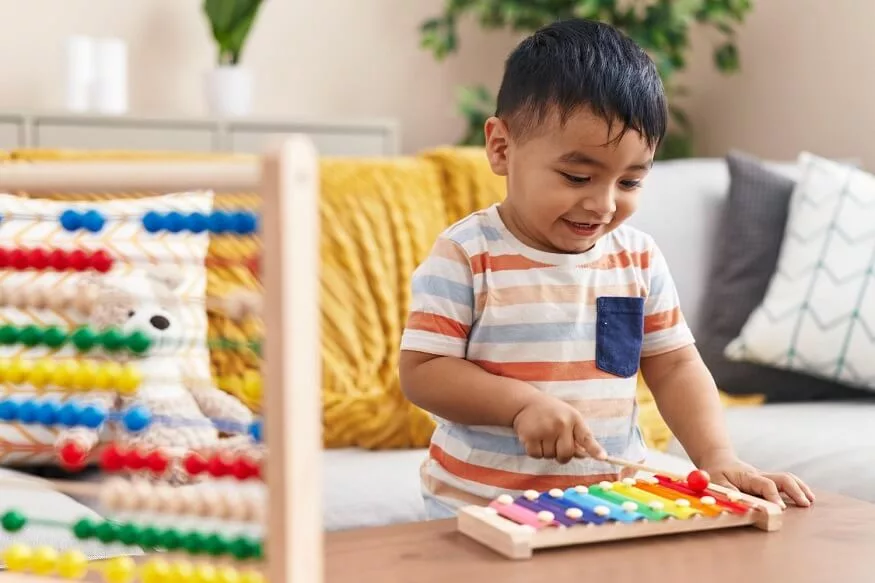Building and expanding a child’s vocabulary is akin to laying the foundation for a lifetime of communication skills, academic success, and a rich inner life. Vocabulary is not just a list of words; it’s a bridge to thoughts, ideas, and understanding. As such, there are numerous strategies that parents and educators can adopt to enrich a child’s vocabulary from an early age.
Also Read: Impact Of Technology on English Language Evolution
Early Exposure to Language
The quest to expand a child’s vocabulary begins at birth. Babies and toddlers soak up words as they interact with their environment. Engage in ‘parentese’, the high-pitched, melodic form of talking to babies. This not only holds their attention but also increases the likelihood that they will remember and understand the words you use. Reading to a child, even in infancy, is a proven method for word acquisition. Choose a variety of books: picture books, storybooks, and later, age-appropriate novels and non-fiction. The rich language found in literature is often not used in everyday conversation and can introduce new concepts and vocabularies.
Conversational Engagement
Engaging children in conversation is one of the most effective ways to build their vocabulary. This doesn’t mean simply talking to them, but talking with them. Make every interaction a learning opportunity, discussing new and interesting topics, and don’t shy away from using sophisticated words. Children are incredibly adept at picking up meanings from context.
Creating a Word-Rich Environment
The environment in which a child grows up can significantly impact their vocabulary development. Create a home where books, magazines, and other reading materials are easily accessible. Display words on posters and have magnetic words on the fridge. Use labels to name everyday items around the house. All these create a print-rich environment that naturally encourages children to explore and learn new words.
Vocabulary Games
Make learning new words fun by incorporating games into your routine. Classic board games like Scrabble or Boggle can be excellent for older children. For younger ones, word matching games, flashcards, and online educational games can be both engaging and instructive. Puzzles that focus on word recognition and spelling also contribute to vocabulary building in a playful way.
Storytelling and Role-Play
Children love stories, and storytelling can be a powerful tool to enhance vocabulary. When you tell stories, embellish them with vivid descriptions and varied vocabulary. Encourage children to tell their own stories, too. Role-playing games are another fantastic avenue for introducing new words. When children pretend to be characters from different walks of life, they naturally encounter and learn words that they might not come across in their everyday conversations.
Encourage Writing
Writing compliments reading and can greatly assist in vocabulary building. Encourage children to keep journals, write letters, or make up stories. As they look for the right words to express their thoughts and feelings, they will naturally seek out new words and phrases. Help them edit their work, discussing word choices and introducing them to the thesaurus.
Utilising Technology
In today’s world, technology can be a great ally in vocabulary building. There are countless apps and online resources designed to enhance vocabulary through games, stories, and interactive lessons. While it’s important to monitor and limit screen time, these resources can offer an engaging way to learn new words. Additionally, watching educational programmes or listening to audiobooks can also introduce new vocabulary.
Incorporating New Words in Daily Life
Any new word learned is more likely to be remembered if it’s used in context. When a child learns a new word, encourage them to use it in sentences throughout the day. You can also model this behaviour by consciously using new words yourself during daily interactions. This practice not only reinforces the word in the child’s memory but also demonstrates its practical application.
Reading Aloud and Shared Reading
Beyond just reading to a child, engage in shared reading activities. Ask the child to read aloud passages from books, which can help with pronunciation and understanding. Discuss the meanings of words and phrases after reading them. Shared reading can also include discussing the motivations of characters and predicting future plot points, which requires understanding nuanced language.
Also Read: The Top 10 Hardest Words to Pronounce in English
Teaching Word Roots and Language Patterns
Understanding the building blocks of words — prefixes, suffixes, and roots — can empower children to decode unfamiliar words and their meanings. For instance, once a child understands that ‘bio’ relates to life, they can figure out the meanings of words like ‘biology’, ‘biography’, and ‘biodegradable’. Learning about etymology, or the origin of words, can also be fascinating and educational.
Patience and Praise
Patience is essential in this process. Children will not remember every new word instantly. They need time and repetition to internalise them. When a child successfully uses a new word, praise them. This positive reinforcement will make them more eager to continue learning and using new words.
Cultural Exposure
Exposing children to different cultures and languages can vastly broaden their horizons and vocabulary. Whether through travel, cultural events, or food, every new experience is an opportunity to learn and apply new words. Similarly, learning a second language can not only improve cognitive abilities but also increase awareness of one’s primary language, leading to better vocabulary skills overall.
Setting a Good Example
Children mimic adults, so it’s important to be a good role model when it comes to language. Use a rich and varied vocabulary yourself. Show curiosity about words and be willing to look up unknown words together. This not only teaches new words but also demonstrates a lifelong love of learning.
Regular Reading Habits
Establish a routine that includes regular reading. It could be a bedtime story for younger children or a family reading hour for older ones. Regular exposure to written language is one of the most effective ways to expand vocabulary. This habit helps children encounter words in different contexts, which is essential for deep understanding and retention.
Exploring Poetry and Music
The rhythm and rhyme of poetry and music make them excellent tools for vocabulary development. They can help children remember new words and phrases easily, and they also introduce them to language that is more complex and descriptive than everyday speech.
Building and expanding a child’s vocabulary is not a singular activity but an amalgamation of persistent efforts, conscious engagement, and creating a nurturing environment that celebrates words and language. EuroSchool nurtures academic excellence, enriching language skills through immersive learning experiences.










